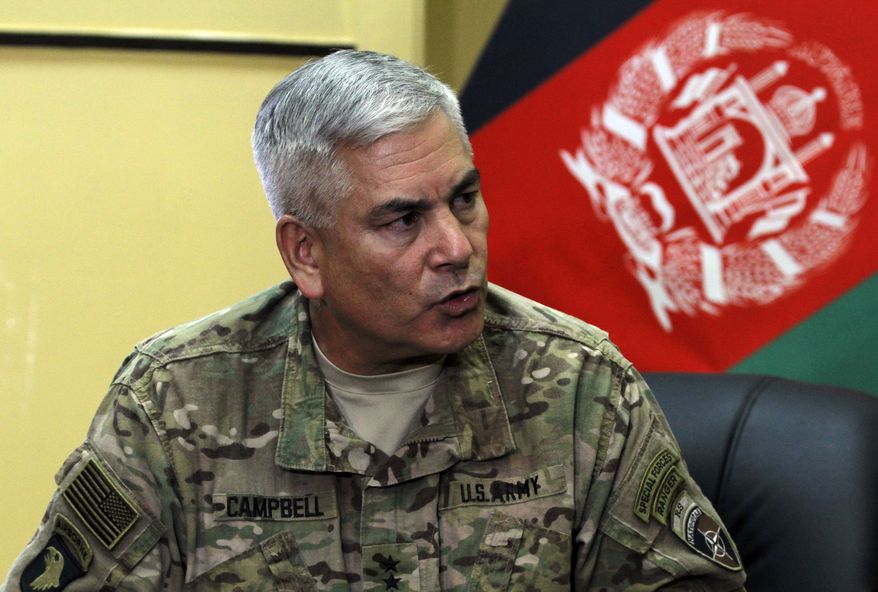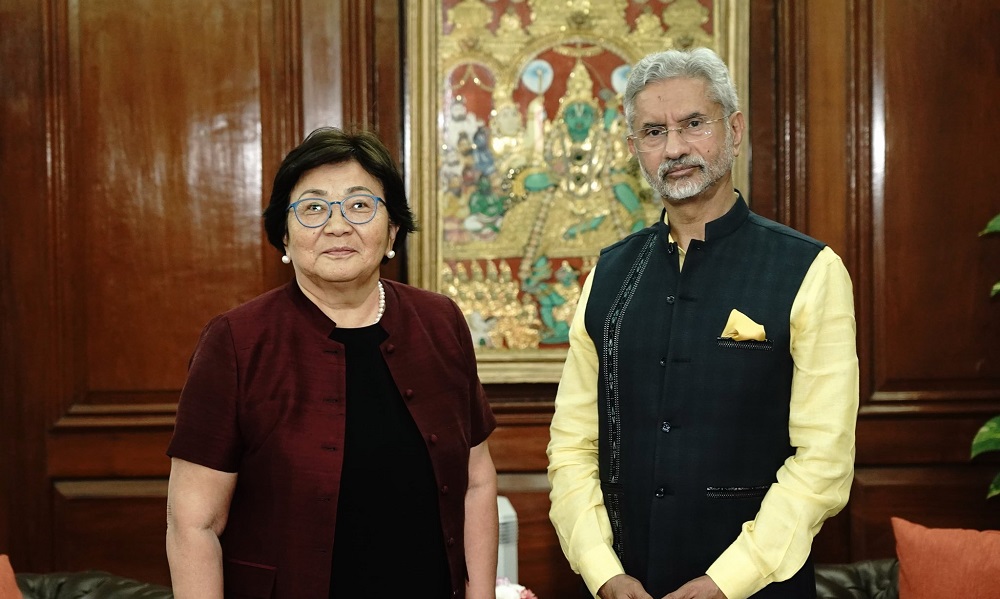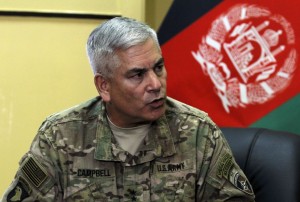Latest News
More troops may be needed in Afghanistan: Gen. Campbell

The top US and Nato military commander in Afghanistan may seek additional American troops to help local forces as they struggle to contain the Taliban insurgency, according to reports.
Army Gen. John Campbell said in an interview with USA TODAY that maintaining the current force of 9,800 U.S. troops to train Afghan forces and conduct counter-terrorism raids is vital, and that the scheduled reduction to 5,500 by Jan. 1, 2017, should be put off as long as possible.
“My intent would be to keep as much as I could for as long as I could,” Campbell said by telephone from Kabul. “At some point it becomes physics. I’m going to have to get them out.”
News from Afghanistan in 2015, when American troops ended their daily combat mission after 14 years, has been grim.
Taliban insurgents stormed the northern provincial capital of Kunduz in October and were pushed out after fierce fighting that included an inadvertent attack by a U.S. warplane on hospital that killed 42 civilians.
In the south, Taliban insurgents have battered Afghan troops in Helmand province; an al-Qaeda training camp was also discovered there and destroyed.
Islamic State fighters have set up outposts in the east. Last week, six U.S. airmen were killed by a suicide bomber outside Bagram Air Base.
The Pentagon’s own quarterly assessment of security in Afghanistan this month noted that in “the second half of 2015, the overall security situation in Afghanistan deteriorated with an increase in effective insurgent attacks and higher (Afghan security force) and Taliban casualties.”
Campbell will be Washington soon to brief senior leaders on the security situation in Afghanistan and troop levels required for their missions. He declined to offer specifics on his recommendations, saying they were classified.
“Some of them will not go over well with people,” Campbell said. “Some of them will get approved.”
In October, President Obama announced that he was reversing his decision to withdraw all but embassy personnel by the end of 2016. Instead, 9,800 U.S. troops will remain through most of 2016. After that, the residual force of 5,500, Obama said, will be a key part of a counter-terrorism network stretching west into Africa.
The long-term U.S. commitment by Obama encouraged Afghan leaders, troops and neighboring Pakistan, Campbell said. Still, Campbell said he won’t hesitate to ask for more troops for Afghanistan if necessary. He has commanded all NATO forces there since Aug. 2014.
“My job as commander on the ground is to continually make assessments,” Campbell said. “Every time I’ve gone to the president and said, ‘I need X,’ I’ve been very, very fortunate that he’s provided that. So he’s been very flexible. It’s actually been conditions based as we’ve gone forward.
“If I don’t believe that we can accomplish the train, advise and assist and the (counter-terrorism) missions, then I owe it to the senior leadership to come back and say, ‘Here’s what I need.’ If that’s more people, it’s more people.”
Campbell is a highly regarded officer and former vice chief of staff for the Army. If he does ask for more troops, he’ll have high-profile allies on Capitol Hill, including Rep. Mac Thornberry, the Texas Republican and chairman of the House Armed Services Committee.
Thornberry called the troop level of 9,800 “a political number to make sure we were under 10,000.” If more U.S. troops are needed, and if they need greater leeway in prosecuting the war, Campbell should have them, Thornberry said in an interview.
“The sheer lack of numbers as well as the restrictions our folks are put under handicap our efforts,” Thornberry said.
Earlier this year, U.S. troops were stretched so thin that they advised their Afghan partners by video conference, Thornberry said. He said he’d rely on commanders for a recommendation on troop levels, adding that they had sought as many as 20,000.
“Nobody is looking to re-insert 100,000 combat troops,” he said.
Michael O’Hanlon, a military analyst at the Brookings Institution who recently traveled to Afghanistan, said a contingent of 12,000 U.S. troops would be able to advise Afghan forces involved in the toughest fights and to battle terrorists. At that level, in teams ranging from dozens to hundreds, U.S. troops could provide the sort of expertise they offered Iraqi forces in retaking Ramadi this week from Islamic State fighters, he said.
In any event, O’Hanlon doesn’t expect decisions so soon after Obama agreed to the October commitment of troops that will extend into the next administration.
“The next president is still going to be in Afghanistan,” O’Hanlon said. “We should think of it as shoring up the eastern flank in the fight against extremists.”
The news from Afghanistan is not all dire, Campbell said. He cited some signs of progress: the number of high-profile suicide bombings that killed or wounded people dropped 36% from 262 in 2014 to 168 in 2015.
“When I drive around Kabul, it’s busy,” he said. “Traffic is almost as bad as Washington, D.C. All the stores are open. It’s still a vibrant city.”
For 2016, Campbell has issued four challenges to Afghan troops, he said. First, they need to drive down attrition by creating a system that allows troops to train, fight and rest to drive down rates. The Afghan military also needs to move from manning checkpoints to taking the fight to the Taliban. Finally, military brass needs to root out bad commanders and do a better job recruiting.
“I think this will drive the Taliban to the peace table,” Campbell said. “If they don’t do those things, it’s going to be a tough fighting season.”
The stakes for the Afghans and the United States couldn’t be higher, he said.
“If we don’t stay engaged here to build their capacity to fight this, keep sanctuary down, it’s coming back to the homeland,” Campbell said. “So it’s pay a little bit now, build the capability, and keep this an away game as opposed to a home game.”

Latest News
IEA urges World Bank to resume work on 7,000 incomplete projects

Officials at the Ministry of Rural Rehabilitation and Development (MRRD) say 7,000 incomplete projects of the World Bank are at risk of destruction in Afghanistan. They call on the World Bank to resume the work of these projects.
According to them, discussions have been held with the World Bank about these projects, but there has been no result yet.
“7,000 incomplete projects are being destroyed, and if the work is not started, these projects will be destroyed. We ask the World Bank to resume the work of these projects as soon as possible,” said Noorul Hadi Adel, the spokesperson of MRRD.
Meanwhile, members of the private sector also ask international institutions to resume their work in Afghanistan.
According to the officials of this sector, with the start of these projects, job opportunities will be provided for thousands of people in the country.
“These projects create employment for our people and the country will grow a lot,” said Mirwais Hajizadeh, a member of the private sector.
However, economic experts stated if the work of these projects does not start soon, they will be destroyed and the investments made in them will be wasted.
Latest News
Ten people killed by floods in Helmand

Ten people have been killed and six others injured by floods in Helmand province in the past week, local officials said on Friday.
According to officials, seven of those were members of the same family, and they were killed in Kajaki district last night.
“Most of the people moved from vulnerable areas to high lands and mountains, and thanks Allah the number of casualties is low,” Sher Mohammad Vahdat, the head of information of the Directorate of Information and Culture in Helmand, said adding rescue teams and security forces have been dispatched to help people.
It is said that the telecommunication system has also been disrupted due to the effect of floods in Kajaki district. Floods have also destroyed thousands of acres of agricultural land.
Latest News
UN envoy meets Indian foreign minister to discuss Afghanistan

Roza Otunbayeva, the UN Secretary General’s Special Representative for Afghanistan, met with the Indian Foreign Minister Subrahmanyam Jaishankar in New Delhi and discussed issues related to Afghanistan, it was announced on Thursday.
During the meeting, Otunbayeva thanked India for “its critical humanitarian support and longstanding friendship for the Afghan people” and discussed the importance of regional and international cooperation to address prevailing challenges in Afghanistan, UNAMA said on X.
Jaishankar also said on X that the sides exchanged views on the current situation in Afghanistan.
“Underlined that India has provided wheat, medicines, pesticides and school supplies. Appreciate the role of UN agencies as partners in these endeavors,” he said.
-

 Sport4 days ago
Sport4 days agoACL fever grows as fixtures finalized
-

 World5 days ago
World5 days agoUS will not take part in any Israeli retaliatory action against Iran
-

 Latest News4 days ago
Latest News4 days agoOver 50 people dead in traffic accidents over Eid
-

 Latest News4 days ago
Latest News4 days agoUS identifies Kabul airport suicide bomber
-

 Business4 days ago
Business4 days agoAfghanistan-Kazakhstan chamber of commerce opens in Herat
-

 Latest News5 days ago
Latest News5 days agoGood rains enable DABS to increase power production in Kabul
-

 World4 days ago
World4 days agoIsraeli military vows response to Iran attack as calls for restraint mount
-

 Latest News3 days ago
Latest News3 days agoPakistani police give Afghans in Balochistan one day to leave

















